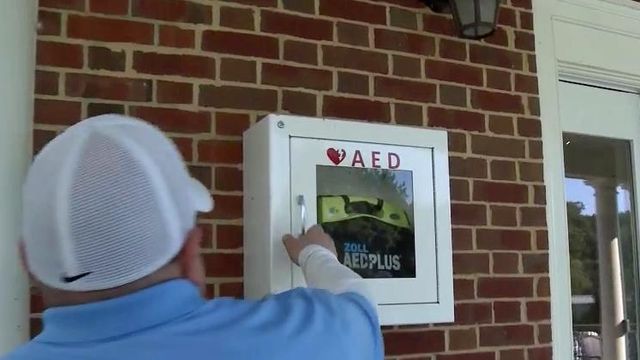Quick action, good fortune save life after heart attack on Chapel Hill golf course
More than 350,000 cardiac arrests occur outside of a hospital every year in the U.S., according to the American Heart Association. Less than half get the help they need before emergency help arrives.
Posted — UpdatedYou never know when or where someone's heart might stop beating.
More than 350,000 cardiac arrests occur outside of a hospital every year in the U.S., according to the American Heart Association. Less than half get the help they need before emergency help arrives.
That response was put to the test on a Chapel Hill golf course last July.
It was a hot Wednesday, July 27 when three men were at Finley Golf Course, but they were playing on separate holes. They met for the first time on the 15th green.
Retired UNC pathologist Dr. Mike Jones' friends say he was having a great game. The last thing he remembers, he was bending over a putt, and he lost consciousness.
"I saw the incident unfold from the opposite fairway," said Steve Friedman, who assisted with CPR. "Initially I thought he had a heat related injury."
Friedman says someone called 911.
Scorecards include a map with heart shapes indicating where AEDs, or Automatic Defibrillators, can be found. One was at the club house where course employee Gary Stec went into action. He was trained in CPR and use of AEDs.
"I came up, and Steve and the other gentleman were doing CPR and rescue breathing down here," said Derrick Andrews, who is a cardiac intensive care nurse at UNC Hospitals.
Andrews continued: "I've been trained to be a code blue nurse at the hospital, meaning I respond to cardiac arrests anywhere in the hospital."
The day at the golf course, though, was his first case outside the hospital.
Friedman assisted with two rescue breaths between every 30 chest compressions from Andrews.
Still, Jones was not responding.
"Really, the thing that was going to make the difference was getting that AED down here," Andrews said.
The AED worked, and soon EMS crews arrived.
At UNC Hospitals, a stent opened up Jones' blocked heart artery. He was up and walking the next day but had a sore chest from cracked ribs.
"I've been told that unless you crack a few ribs, you really haven't done the right kind of CPR," Jones said.
He's taking it easier now, but he's already able to play 9 holes.
Jones says he's thankful it happened here, on that day, with the people who were trained, ready and willing.
"Everybody needs to know how to do CPR," Jones said. "I'm a very lucky guy."
• Credits
Copyright 2024 by Capitol Broadcasting Company. All rights reserved. This material may not be published, broadcast, rewritten or redistributed.





